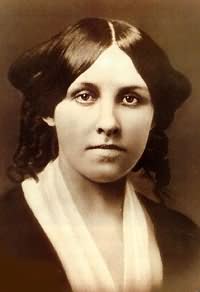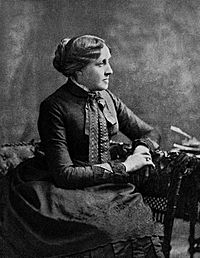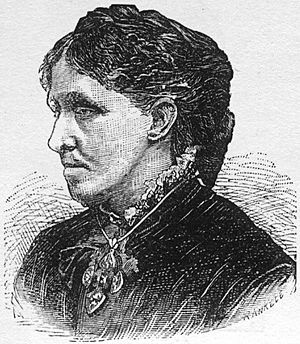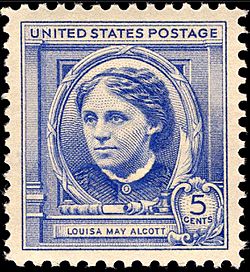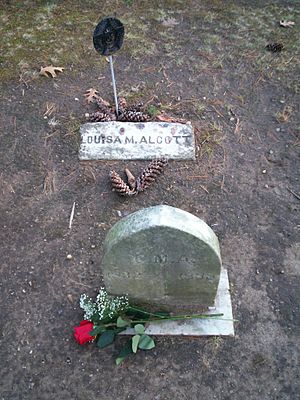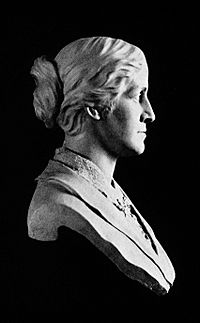Louisa May Alcott facts for kids
Quick facts for kids
Louisa May Alcott
|
|
|---|---|
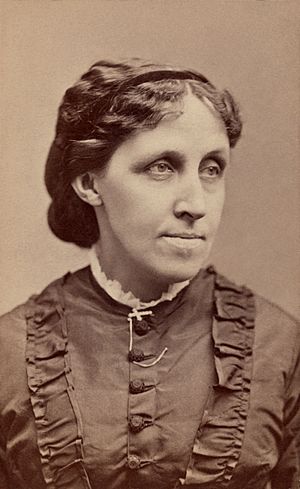
Alcott, c. 1870
|
|
| Born | November 29, 1832 Germantown, Pennsylvania U.S. (present-day Philadelphia) |
| Died | March 6, 1888 (aged 55) Boston, Massachusetts, U.S. |
| Resting place | Sleepy Hollow Cemetery, Concord, Massachusetts, U.S. |
| Pen name | A. M. Barnard |
| Occupation | Novelist |
| Period | American Civil War |
| Genre |
|
| Subject | Young adult fiction |
| Signature | |
Louisa May Alcott (November 29, 1832 – March 6, 1888) was an American writer. She wrote novels, short stories, and poems. She is most famous for her novel Little Women (1868) and its follow-up books, Little Men (1871) and Jo's Boys (1886).
Louisa grew up in New England with her parents, Abigail May and Amos Bronson Alcott. Her parents were Transcendentalists, a group of thinkers who believed in the goodness of people and nature. She met many famous thinkers of her time, like Ralph Waldo Emerson and Henry David Thoreau.
Her family often faced money problems. Louisa started working and writing at a young age to help support them. Her writing became popular in the 1860s. Early in her career, she sometimes used fake names, like A. M. Barnard. Under this name, she wrote exciting stories for adults.
Little Women was published in 1868. It is set in the Alcott family home, Orchard House, in Concord, Massachusetts. The story is based on Louisa's own childhood with her three sisters: Abigail May Alcott Nieriker, Elizabeth Sewall Alcott, and Anna Alcott Pratt. The book was very popular then and is still loved by both kids and adults today. It has been made into many plays, movies, and TV shows.
Louisa May Alcott believed strongly in equal rights. She was an abolitionist (someone against slavery) and a feminist (someone who supports women's rights). She never married. She also supported other movements, like temperance (reducing alcohol use) and women's right to vote. She died from a stroke in Boston on March 6, 1888, just two days after her father passed away.
Contents
Louisa's Early Life
Louisa May Alcott was born on November 29, 1832, in Germantown, Pennsylvania. This was her father's 33rd birthday. Her parents were Amos Bronson Alcott, a teacher and Transcendentalist, and Abigail "Abby" May, a social worker. Louisa was the second of four daughters. Her older sister was Anna Bronson Alcott. Her younger sisters were Elizabeth Sewall Alcott and Abigail May Alcott. As a child, Louisa was a tomboy and preferred playing boys' games.
In 1834, her family moved to Boston. There, her father started an experimental school called Temple School. He also joined the Transcendental Club with friends like Ralph Waldo Emerson and Henry David Thoreau. Her father's strong ideas about education and raising children, along with his difficulty providing for the family, caused some tension. Louisa's mother felt that women were not treated equally. She taught Louisa to also believe in fighting for women's rights.
In 1840, the Alcott family moved to a small cottage in Concord, Massachusetts. They lived there for three happy years. In 1843, they joined a community called Fruitlands for a short time. After this community ended, they bought a home in Concord called "Hillside" in 1845. They later sold it to Nathaniel Hawthorne. The Alcotts moved many times. In 1857, they returned to Concord and moved into Orchard House in 1858. This house later became the setting for Little Women.
Louisa's early education came mostly from her father. She also learned from family friends who were famous writers and thinkers, such as Ralph Waldo Emerson, Nathaniel Hawthorne, and Margaret Fuller. She later wrote about her family's time at Fruitlands in a story called "Transcendental Wild Oats."
Because her family was poor, Louisa started working at a young age. She worked as a teacher, seamstress, and governess. Her sisters also worked to help the family. Writing became a way for Louisa to express herself. Her first book was Flower Fables (1849), which were stories she wrote for Ralph Waldo Emerson's daughter. Louisa was determined to escape poverty.
In 1847, Louisa and her family helped runaway slaves as part of the Underground Railroad. They housed a slave for a week. Louisa also supported women's suffrage (the right to vote). She became the first woman to register to vote in Concord, Massachusetts, for a school board election. The 1850s were difficult for the Alcotts. In 1858, her younger sister Elizabeth died. Her older sister Anna married, which Louisa felt broke up their close sisterhood.
Working in Dedham
Louisa's mother, Abba, ran an "intelligence office" to help people find jobs. In 1851, Louisa took a job in Dedham to be a companion for a sick woman named Elizabeth Richardson. Louisa hoped it would be an interesting experience.
However, Elizabeth's brother, James Richardson, spent more time with Louisa than his sister did. He talked to her about deep ideas, but Louisa found it boring. She reminded him that she was supposed to be Elizabeth's companion. He then gave her harder chores, like chopping wood.
Louisa quit after seven weeks. She was unhappy with her pay of four dollars and sent the money back to him. She later wrote a story about this experience called How I went into service. A publisher rejected it, telling her she had no future as a writer.
Louisa's Writing Success
As an adult, Louisa was a strong supporter of ending slavery and women's rights. In 1860, she began writing for a magazine called Atlantic Monthly. When the American Civil War began, she worked as a nurse for six weeks in 1862–1863. She became very sick with typhoid fever and had to leave.
Her letters home about her time as a nurse were published as Hospital Sketches (1863). This book brought her first praise for her humor and observations. It was her first book and showed her passion for seeing the war firsthand. Her main character, Tribulation Periwinkle, grows from an innocent person to a wise observer.
Between 1863 and 1872, Louisa secretly wrote many exciting "gothic thrillers" for popular magazines. She used the name A. M. Barnard. These stories were full of drama and adventure. Examples include A Long Fatal Love Chase. The main characters in these books were often strong and smart women. After her children's stories became popular, she stopped writing for adults. She also wrote a novel called Work (1873), which was partly about her own life.
Louisa May Alcott is also known for creating one of the earliest detective fiction stories in American literature. This was her 1865 thriller "V.V., or Plots and Counterplots."
Louisa became even more successful with the first part of Little Women: or Meg, Jo, Beth and Amy (1868). This book was based on her childhood with her sisters. She became an editor for a children's magazine, Merry's Museum. There, a publisher named Thomas Niles encouraged her to write a book especially for girls.
The second part, Good Wives (1869), followed the March sisters as adults. Little Men (1871) was about Jo's life at the Plumfield School she started. Finally, Jo's Boys (1886) finished the "March Family Saga."
In Little Women, Louisa based the main character "Jo" on herself. However, Jo marries in the story, but Louisa never did in real life. She once said she felt like "a man's soul put by some freak of nature into a woman's body." She meant she felt very independent. Each character in Little Women has parts of people from Louisa's life. For example, Beth's death is like her sister Lizzie's death. Jo's rivalry with Amy is like Louisa's own rivalry with her sister May. Even though Louisa never married, she took care of May's daughter, Lulu, after May died in 1879.
Little Women was very popular. Critics said it was a fresh and natural story about daily life that many ages could enjoy. One reviewer called it "the very best of books to reach the hearts of the young of any age from six to sixty." After the book's success, Louisa often avoided public attention.
Louisa May Alcott was recognized for her contributions to women's literature. She was inducted into the National Women's Hall of Fame in 1996.
Louisa's Later Years
In 1877, Louisa helped start the Women's Educational and Industrial Union in Boston. After her youngest sister May died in 1879, Louisa took care of her niece, Lulu, who was named after Louisa.
Louisa had health problems in her later years. She often felt dizzy. She and her first biographers believed her illness and death were caused by mercury poisoning. During her time as a nurse in the American Civil War, she got typhoid fever. She was treated with a medicine that contained mercury. However, recent studies suggest her health problems might have been from an autoimmune disease.
Louisa died from a stroke at age 55 in Boston, on March 6, 1888. This was just two days after her father died. She is buried in Sleepy Hollow Cemetery in Concord. Her grave is near other famous writers like Emerson, Hawthorne, and Thoreau. Her niece Lulu was only eight years old when Louisa died. Lulu was then cared for by Louisa's sister Anna.
Louisa often wrote in her journals about going on long walks and runs. She encouraged her young female readers to be active too, which was not common for girls at that time.
The Alcotts' home in Concord, Massachusetts, Orchard House, is now a historic museum. The family lived there for 25 years, and Little Women was written and set there. The museum focuses on teaching people about the Alcotts and preserving history. Her Boston home is part of the Boston Women's Heritage Trail.
Louisa May Alcott's Books
The Little Women Series
- Little Women, or Meg, Jo, Beth and Amy (1868)
- Second Part of Little Women, or Good Wives (1869)
- Little Men: Life at Plumfield with Jo's Boys (1871)
- Jo's Boys and How They Turned Out: A Sequel to "Little Men" (1886)
Other Novels
- Moods (1865)
- An Old Fashioned Girl (1870)
- Work: A Story of Experience (1873)
- Eight Cousins or The Aunt-Hill (1875)
- Rose in Bloom: A Sequel to Eight Cousins (1876)
- Under the Lilacs (1878)
- Jack and Jill: A Village Story (1880)
As A. M. Barnard
- Behind a Mask, or a Woman's Power (1866)
- A Long Fatal Love Chase (1866; first published 1995)
Published Anonymously
- A Modern Mephistopheles (1877)
Short Story Collections for Children
- Aunt Jo's Scrap-Bag (1872–1882) (66 short stories in six books)
- Lulu's Library (1886–1889) (32 short stories in three books)
- Flower Fables (1849)
- Morning-Glories and Other Stories (1867)
- Kitty's Class Day and Other Stories (1868)
- Spinning-Wheel Stories (1884)
- The Candy Country (1885)
- A Garland for Girls (1887)
Other Short Stories and Novelettes
- Hospital Sketches (1863)
- Pauline's Passion and Punishment (1863)
- Transcendental Wild Oats (1873) (A story about Alcott's family and the Transcendental Movement)
- Silver Pitchers, and Independence: A Centennial Love Story (1876)
- A Whisper in the Dark (1877)
See also
 In Spanish: Louisa May Alcott para niños
In Spanish: Louisa May Alcott para niños
 | Claudette Colvin |
 | Myrlie Evers-Williams |
 | Alberta Odell Jones |


